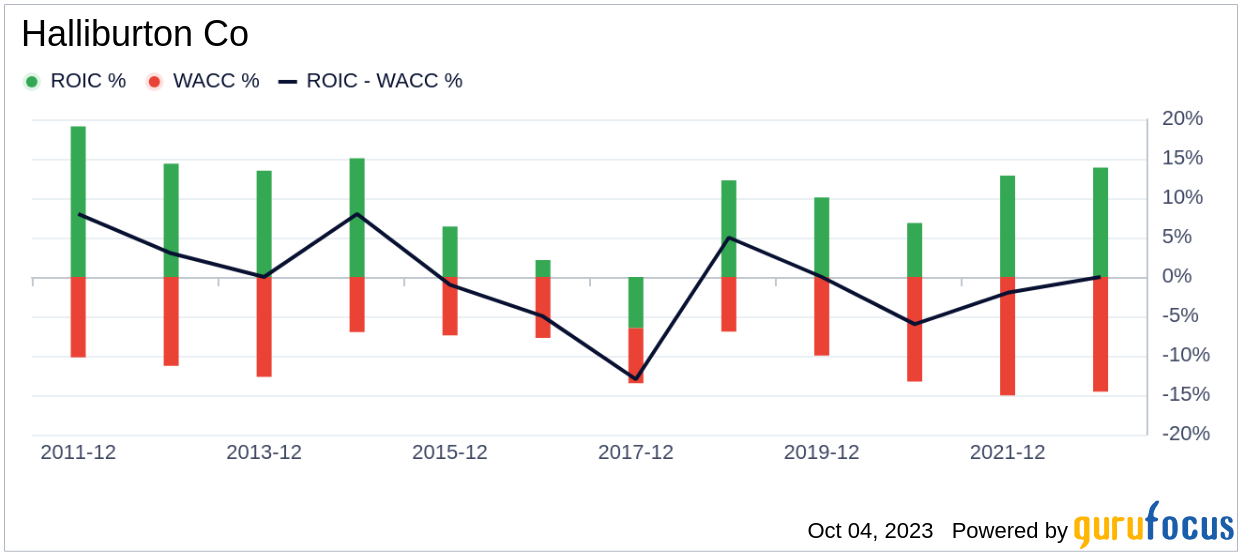Today, we delve into the financial landscape of Halliburton Co (HAL, Financial), a leading innovator in hydraulic fracturing and a top player in the oilfield service industry. With a daily loss of -4.42%, a 3-month gain of 15.23%, and an Earnings Per Share (EPS) of 2.72, we aim to answer the question: Is the stock fairly valued? In this comprehensive analysis, we will explore Halliburton Co's valuation, financial strength, profitability, and growth. We invite you to read on for an informed perspective on this investment opportunity.
Company Introduction
Halliburton Co, one of the three largest oilfield service firms globally, boasts superior expertise across various business lines, including completion fluids, wireline services, cementing, and more. As the number-one pressure pumper in North America, it has led the way in hydraulic fracturing over the past two decades. With a current stock price of $38.29 and a GF Value of $38.11, Halliburton Co appears to be fairly valued. This comparison sets the stage for a deeper exploration of the company's value, merging financial assessment with crucial company details.
Understanding GF Value
The GF Value represents the current intrinsic value of a stock derived from our exclusive method. The GF Value Line on our summary page gives an overview of the fair value that the stock should be traded at. It is calculated based on three factors:
- Historical multiples (PE Ratio, PS Ratio, PB Ratio and Price-to-Free-Cash-Flow) that the stock has traded at.
- GuruFocus adjustment factor based on the company's past returns and growth.
- Future estimates of the business performance.
We believe the GF Value Line is the fair value that the stock should be traded at. The stock price will most likely fluctuate around the GF Value Line. If the stock price is significantly above the GF Value Line, it is overvalued and its future return is likely to be poor. On the other hand, if it is significantly below the GF Value Line, its future return will likely be higher.
At its current price of $38.29 per share, Halliburton Co has a market cap of $34.40 billion and the stock is estimated to be fairly valued. Therefore, the long-term return of its stock is likely to be close to the rate of its business growth.
Link: These companies may deliver higher future returns at reduced risk.
Financial Strength
Companies with poor financial strength offer investors a high risk of permanent capital loss. To avoid this, an investor must research and review a company's financial strength before deciding to purchase shares. Both the cash-to-debt ratio and interest coverage of a company are great ways to understand its financial strength. Halliburton Co has a cash-to-debt ratio of 0.23, which ranks worse than 66.57% of 1026 companies in the Oil & Gas industry. The overall financial strength of Halliburton Co is 6 out of 10, which indicates that the financial strength of Halliburton Co is fair.
Profitability and Growth
It is less risky to invest in profitable companies, especially those with consistent profitability over the long term. A company with high profit margins is usually a safer investment than those with low profit margins. Halliburton Co has been profitable 5 over the past 10 years. Over the past twelve months, the company had a revenue of $22.40 billion and Earnings Per Share (EPS) of $2.72. Its operating margin is 17.06%, which ranks better than 64.15% of 979 companies in the Oil & Gas industry. Overall, the profitability of Halliburton Co is ranked 6 out of 10, which indicates fair profitability.
Growth is probably the most important factor in the valuation of a company. GuruFocus research has found that growth is closely correlated with the long term performance of a company's stock. The faster a company is growing, the more likely it is to be creating value for shareholders, especially if the growth is profitable. The 3-year average annual revenue growth rate of Halliburton Co is -4.4%, which ranks worse than 76.98% of 860 companies in the Oil & Gas industry. The 3-year average EBITDA growth rate is 45.5%, which ranks better than 80.87% of 826 companies in the Oil & Gas industry. This indicates fair growth.
ROIC vs WACC
Another way to evaluate a company's profitability is to compare its return on invested capital (ROIC) to its weighted cost of capital (WACC). Return on invested capital (ROIC) measures how well a company generates cash flow relative to the capital it has invested in its business. The weighted average cost of capital (WACC) is the rate that a company is expected to pay on average to all its security holders to finance its assets. If the ROIC is higher than the WACC, it indicates that the company is creating value for shareholders. Over the past 12 months, Halliburton Co's ROIC was 17.25, while its WACC came in at 11.14.
Conclusion
In summary, Halliburton Co (HAL, Financial) stock is estimated to be fairly valued. The company's financial condition is fair, and its profitability is also fair. Its growth ranks better than 80.87% of 826 companies in the Oil & Gas industry. To learn more about Halliburton Co stock, you can check out its 30-Year Financials here.
To find out the high-quality companies that may deliver above-average returns, please check out GuruFocus High Quality Low Capex Screener.




